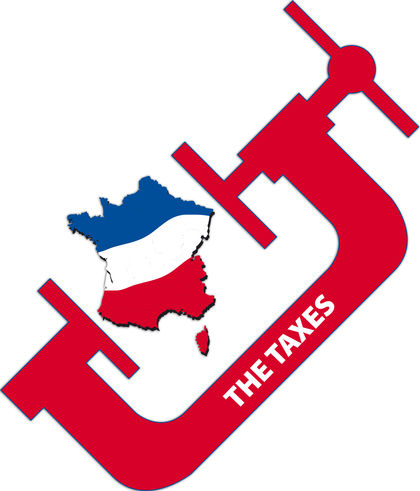France - Taxation

As with most industrialized democratic systems, France's tax system is complex and nuanced., though also subject to recent movements to reductions and simplifications. The basic corporate income tax rate was for filings in 2003 was 33.33%, with surcharges of 3% (as of January 2002, reduced from 6% in 2001 and from 10% in 1995 when first introduced) and 3.3% (since January 2000, for large companies only), giving an effective rate of 35.43%. For smaller companies with annual revenues less than €7,630.000 and in which individuals own at least 75% of the equity, the basic corporate tax rates in 2002 were 15% (an effective 15.45% with the 3% surcharge and down from 26.5% in 2001) on profits below €38,120, and 33.33% (effective 34.33%, down from 35.33% in 2001) on profits above €38,120. Long-term capital gains were taxed at a basic rate of 19%, with effective rates ranging from 19.57% to 20.20%, in 2002, down from effective rates of 20.14% to 20.77% in 2001. Short-term capital gains are taxed according to the progressive individual income tax schedule. above a threshold of €15,000 (up from €7,650 in 2001) were taxed at 26%. The main local tax is the business tax, charged on 84% of a value derived from the rental value of the premises, 16% of the value fixed assets, and 18% of annual payroll, and at rates set by local authorities each year. The business tax (taxe professionelle) varies significantly from place to place, with a range of 0% to 4%.
Individual income tax in France is assessed in accordance with a progressive schedule of statutory rates ranging from 0% (up to €4,121in 2002) to 52.75% (in 2002, on the increment of annual income above €46,343), with intermediate brackets of 7.5%, 21%, 31%, 41%, and 46.75%. French tax law contains many provisions for exemptions and targeted reductions from taxable income, so that the actual income tax paid is highly individualized. According to a 2002 OECD report, the disposable income of the average production worker was 73.2% of gross pay, and 79% of gross pay for a single-earner married couple with two children. Non-industrial businesses that do not pay value-added taxes on consumption (banks, insurance companies, the medical sector, associations, non-profit organizations, etc.) pay a wage tax to cover social levies assessed according to a three-bracket progressive schedule: 4.25% on the portion of annual wage below €6,460; 8.5% on the portion between €6,460 and €12,900, and 13.6% on the portion above €12,900. Inheritance taxes (succession duties) range from 5% to 60%, as do gift (donations) taxes. There is also a patrimonial tax of 3% on the fair market value of property owned in France, although foreign companies whose French financial assets are more than 50% are exempt. Also, foreign property holders may be exempt according to the terms of a bilateral tax treaty with France. (France is party to a numerous bilateral tax treaties with provisions that can greatly reduce tax liabilities for foreign investors.) Local taxes include a property tax, charged to owners of land and buildings, and a housing tax, charged to occupants of residential premises, assessed according to the rental value of the property. The social security system is operated separately from the general tax system, financed by contributions levied on earned income in accordance with four regimes: a general regime covering 80% of French citizens, a regime for agricultural workers, a special regime for civil servants and railway workers, and a regime for the self-employed. Tax levies have been used, however, to shore up the finances in the social security system.
The main indirect tax is the value-added tax (VAT) first introduced in January 1968. The standard rate in 2003 was 19.6% (down from 20.6% in 1995), and there are two reduced rates: 5.5% on basic foodstuffs, and 2.1% on medicines and newspapers.
Comment about this article, ask questions, or add new information about this topic: